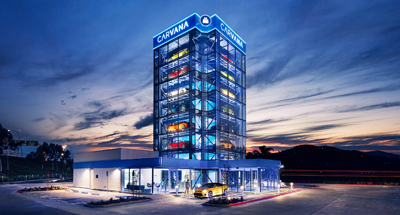Car dealership Carvana accused Michigan Secretary of State Jocelyn Benson of violating state laws after the state suspended the license of the Carvana dealership in Novi, MI, earlier in October, and it wants the courts to intervene.
On Oct. 13, Carvana filed injunction motions with the Michigan Court of Claims asking for an immediate stop to the secretary of state’s "illegal and irresponsible attempt to shut down a growing Michigan business with tens of thousands of customers over what amounts to technical paperwork violations involving title and transfer issues," Carvana spokesperson Kristin Thwaites told the Free Press in an email.
The motions accuse the state of suspending Carvana's license without a hearing, which deprived Michigan consumers the chance to get their purchased vehicles in a timely manner. The court papers also allege Benson's suspension of Carvana's license violates the Michigan Vehicle Code, which Carvana said mandates a hearing be held prior to the suspension of a dealer's license.
Benson's spokesperson Angela Benander said the office does not comment on pending litigation.
A move that won't work
Carvana's filings likely won't succeed, said Erik Gordon, University of Michigan business professor and lawyer.
"It is a sign of weakness that won't work," Gordon said. "The state will not be intimidated. Carvana would be better off spending its time and money remedying the problems the state has identified. It is more likely to draw attention to the state's claims and scare away customers than it is to scare off the state."
In a news release, the state said Carvana LLC, owned by Paul Breaux and located off of Novi Road near I-96, committed several violations of the Michigan Vehicle Code. The alleged violations were discovered by state regulatory staff investigating multiple consumer complaints about title problems with their vehicles.
The Michigan Department of State cited the violations as "imminent harm to the public," a claim Carvana has called "baseless."
'Being singled out'
The two filings consist of a complaint for injunctive relief and a temporary restraining order and injunctive relief.
Carvana's court filings come on the heels of a petition it started after the state suspended its license. It asked for customer support to keep Carvana's business running without interruption. It read: "We believe Carvana is being singled out in order to protect antiquated paperwork and legal requirements that we don't feel are in the best interest of customers." Carvana said in its court filing that 2,900 people had signed the petition.
Benander said in a statement the Michigan Department of State looks to protect consumers and "the Department does this in strict accordance with state and federal laws and does not provide special treatment to any dealership, including large, national corporations."
Benander said state officials met with Carvana on multiple occasions to explain Michigan law and suggest ways for it to comply, but "Carvana continued selling vehicles without titles to scores of Michigan families, putting the residents at risk of legal violations, fines and other penalties."
Angry customers
Carvana's Thwaites said in a statement the state's decision to suspend Carvana's operations "has brazenly violated state law in addition to its own rules, regulations and due process requirements while making false and reckless statements through press releases rather than engaging in constructive dialogue to remedy what are essentially technical paperwork issues."
Thwaites said Michigan's "arbitrary and abrupt actions" of suspension have angered and disappointed customers, "some of whom have literally been stranded without a vehicle they had counted on to get them to work, doctor's appointments or the grocery store."
In the filings, Carvana said that, as of Oct. 10, 71 customers were awaiting delivery of cars they bought and that the state told Carvana it could proceed with those previously scheduled deliveries. But then the state allegedly refused to allow Carvana to do so because paper titles had not yet been signed over to the customers. As a result, 48 customers are experiencing delays due to the "Secretary's sudden and baseless suspension of Carvana's Michigan License," the complaint stated.
The court filing goes on to say the suspension also poses a "catastrophic" threat to the livelihoods of the 115 people who work for Carvana in Michigan and "the damage to Carvana's reputation and goodwill posed by the suspension order is incalculable and irreparable."
'An extraordinary remedy'
The filings ask the courts to stop the secretary of state's "disruptive actions" and instead to work with Carvana to fix what Carvana calls "technical issues" as quickly as possible.
"We’re confident the facts and the truth will come to light through the court process," Thwaites said.
Gordon said don't count on it because courts are reluctant to issue injunctions.
"The person who wants the court to order someone to do something has to convince the court that money (damages) is not enough to remedy the harm," Gordon said. "The person has to convince the court that an order forcing the other side to do something or stop doing it is the only way to do justice. That's why an injunction is called an extraordinary remedy."













